- Home
- Ian Buruma
Taming the Gods Page 4
Taming the Gods Read online
Page 4
Edmund Burke argued, like Hume, that the destruction of traditional institutions is always followed by something worse. Hence the desire for stability, including the stability that hierarchies bring. One does not have to be a passionate believer in God to wish for the preservation of the Anglican Church, or a passionate devotee of monarchy to strive for its continuation. In fact, passion is to be distrusted. It is precisely to contain the lethal passions of man that tradition is needed. When British thinkers denounced the French Revolution for its godlessness, they did not do so as religious fanatics but as traditionalists who equated British liberties with ancient customs, from King Alfred’s Constitution to the rites of the Church of England. Their problem was not with liberty; indeed, they argued that the God-fearing British, who accepted that inequality was part of the human condition, were freer than the godless French citoyens who were forced to conform to a blueprint for a democratic utopia.
British conservatives had a peculiar ally of sorts in one of the most ferocious French authoritarians thrown up by the Enlightenment: Joseph de Maistre. A minor aristocrat from the south and a Jesuit by education, Maistre was a liberal of sorts until the revolution and its aftermath changed his mind radically. Revolution now struck him as God’s punishment for the hubris of man. Not an especially pious figure, he still exalted the Catholic Church because of its divine authority and its dogmatism. He pined for the return of absolute monarchy and believed that only the most punitive justice could suppress the evil nature of man.
Rationalism, science, equality, natural rights, democracy, liberalism—these were all loathsome concepts to him. He was a leading light of the counter-Enlightenment, but not because of some Romantic passion for mystery or obscurantism. He was not a Romantic. He was a radical pessimist. The Enlightenment, to him, would not bring progress, liberty, or greater knowledge, but chaos, violence, and depravity. Man could not be left to his own devices. That is why order had to be enforced by traditional authority, prejudice, instinct, and the hangman. If men decline, he wrote, “to recognize authority where it legitimately lies—in the Church and the ‘divinisé’ monarchy—they will fall under the yoke of the tyranny of the people, which is the worst of all.”25
But Maistre made an odd exception for England. The English, he said, had an unwritten constitution, which was divinely inspired, as it were. Their constitution was not the product of rational thought but merely “felt,” and thus for Maistre a more reliable source of authority than all the shallow and misguided institutions that rationalists put their trust in.
Burke and other British conservatives might easily have gone along with this, even though they didn’t share Maistre’s brutal authoritarianism or indeed his pessimism. Isaiah Berlin wrote about Maistre that temperamentally he resembled his enemies. Like the Jacobins, he was a destroyer, a hater, an extremist. The revolutionaries wished to demolish the old order, create a tabula rasa, and build a new social order from scratch. Maistre, in Berlin’s words, “was the polar opposite of this. He attacked eighteenth-century rationalism with the intolerance and the passion, the power and the gusto, of the great revolutionaries themselves.”26
The difference between France and Britain, or indeed the United States, is the role of the Catholic Church. As Tocqueville pointed out, European unbelievers attacked the church more as a political than a religious enemy. He was certainly right about France. The Catholic Church was an extremely powerful political institution, with vast wealth in land and treasure. The Vatican was a source of absolute truth, and the authority of priests was almost total. The despotic monarchy of France was intimately linked to the church, which is why the Jacobins had to destroy both. Even though Louis XVI was far from despotic, they needed to crush the monarchy and purge religion from the public realm to put the secular state out of the church’s reach. And Maistre, followed by generations of Catholic reactionaries, bent on revenge for the defeat of 1789, longed to revive the authority of church and monarchy to restore the original order.
Thomas Jefferson did not have this problem: Catholics were a vulnerable minority in the United States. This would change in the nineteenth century when new immigrants from Ireland, Italy, and Germany made the Roman church into the largest single Christian denomination and inspired considerable hostility. Only when Protestant hostility to Catholics more or less disappeared could the United States truly be called a country of religious tolerance. But that was in the twentieth century. In the early nineteenth century Tocqueville observed acutely that Catholics wanted all rights to be respected so that “they could be sure to enjoy their own in freedom.” That is why they were led, “perhaps in spite of themselves, toward political doctrines which, maybe, they would adopt with less zeal were they rich and predominant.”27
Jefferson did, of course, follow the French model in pushing religion out of the public sphere. As he said about Pennsylvania and New York, two states without established churches: “They have made the happy discovery, that the way to silence religious disputes, is to take no notice of them.” But he did so not as an enemy of religion. He felt no need to destroy the churches, for none had anything like the power enjoyed by the Catholic Church under the ancien régime in France. On the contrary, he believed that separation of church and state would benefit religion.
On this issue, Jefferson was unwilling to compromise. But in his politics, he was not at all a radical. His ideal was a stable rural society of educated farmers disposed to democracy, because they were responsible for the land they owned. Although by no means a promoter of slavery, he did own slaves himself. And democracy, in his mind, was not really compatible with an industrial society, where large numbers of manual workers lived in huge, “pestilential” cities. He prized independence, which went together with ownership, and distrusted too much government. He wrote in his autobiography: “It is not by the consolidation, or concentration of powers, but by their distribution that good government is effected.” And: “The purpose of establishing different houses of legislation is to introduce the influence of different interests or different principles.”28
This could not be further removed from the Jacobin idea of the state as the embodiment of the people’s will. But even on the religious front, Jefferson’s notion of the secular state, strictly neutral in all religious matters, would soon be challenged by Christians who had a very different idea of the state. Already in the presidential campaign of 1800, Christian believers were accusing Jefferson of being an atheist and thus unfit to be president. Since Christians live “under the law of Christ,” intoned John Mitchell Mason, a Presbyterian minister from New York, they should speak out against the falsehoods of party politics.29 People like Mason continue to argue that the United States is a Christian nation and that the state has the duty to uphold Christian morals, in terms of family life, sexual practices, or the teaching of biology.
Yet they, too, are unlike their French counterparts, for their belief in American democracy, and the uniqueness of American freedoms, stands in stark contrast to the revanchist politics of Maistre, Charles Maurras, founder of the extreme right-wing Action Française, or Marshal Pétain, all of whom viewed democracy, and particularly the United States, with the deepest suspicion. American Christians of the Right may not be liberals and may even be bigots, but they still profess to believe in democracy. They believe, as much as atheists, in the American civil religion, the difference being their conviction that freedom was bestowed on His chosen land by God.
Civil religion is a product of the democratic revolutions, both in the United States and France. What they have in common is their claim to a universal validity, like Christianity, or indeed Islam. The Napoleonic conquests, no less than the American idea of manifest destiny, were justified by the universalist claim. French republicanism, in the minds of its promoters, with its rationalist ideals of liberty, equality, and fraternity, could and indeed should be applied everywhere. In the American case, the secularist idealism of the founding fathers has been complicated by the assertion
among Christian believers that the nation’s destiny is guided by higher powers.
Since such metaphysical assertions can still be heard in the United States today, Europeans are inclined to agree with the American essentialists that they reflect a uniquely American phenomenon. This, too, however, is an error. Similar claims have been made by Protestants in other Western democracies, including or indeed especially in Spinoza’s native country, the Netherlands. The politics of the great Dutch statesman Abraham Kuyper (1837–1920) was but one example of an attempt all over Europe in the mid-nineteenth century to claw back European politics from Enlightenment liberalism. As an orthodox Calvinist, he was hostile to the Catholic Church. His idea of the true Dutch nation was soundly Protestant, an identity forged in the eighty-year revolt against the Spanish king. But he was entirely sympathetic to Pius IX’s all-out attack on godless rationalism and liberalism. His political party, which he led for many years as a cabinet minister and prime minister, was called the Anti-Revolutionary Party.
The revolution it opposed was of course the French one. Kuyper rather admired the American Revolution and was a follower of Burke. But his admiration did not really take into account Jefferson’s Enlightenment ideals. What he liked especially about the United States was its Protestant religiosity and the peaceful nature of its democratic institutions. He shared Burke’s hostility to the French Revolution, even though Burke’s traditionalist view of the Anglican Church was liberal compared to Kuyper’s Calvinist orthodoxy.
In some ways, Kuyper was very much like his populist Christian American counterparts. His distrust of the liberal, educated elite was such that he did not consider them to be part of the Dutch volk. The spirit of Erasmus, Grotius, and Spinoza, in his view, had alienated the Dutch from their Christian roots. Those “deniers of Christ,” those “self-satisfied thinkers,” may be more learned than the common believer, whom Kuyper championed, but they were divorced from “the stream of national life.”30 This is also why he distrusted central government run by city slickers. The real volk lived in small towns. The true national culture was provincial. What Kuyper’s Anti-Revolutionaries aimed at was to re-Christianize the nation, to return Dutch society to its orthodox Protestant roots. His archenemies, more than the Catholics, who were at least believers in God, were the liberals, who had dominated politics since the 1840s.
Also like the American Christians, and unlike the French anti-revolutionaries, he believed in democracy. He even believed in the separation of church and state. Indeed, he insisted on it, for the sake of the church. “Not a state church, but a church state” was his motto. There would be no established church, but everything from school education to national politics should reflect the Calvinist beliefs of the true Dutch people. Since he had to accept, with a certain reluctance, that Catholics, socialists, and liberals shared his nationality, it was impossible to impose his Christian vision on everyone. The solution was not to separate religious belief from political argument or ban religion from the public sphere but to divide the public sphere up into autonomous “pillars.” This was designed to protect religion from the state. The orthodox Protestants would have their own schools, universities, sports clubs, newspapers, pension funds, and political parties, and so would the Catholics, the socialists, and the liberals. People would vote not according to their interests but their deepest beliefs, which were, in the case of pious Christians, held to be the same thing.
Kuyper’s Anti-Revolutionary Party no longer exists. After the pillars were fatally undermined by the social changes of the 1960s, it merged with Catholic and other Christian parties to form the Christian Democrats. But his ideals live on. Apart from the Christian Democrats, there are still a number of political parties reflecting the views of more or less orthodox Protestant denominations. Faith-based education is still financed by the state. The Netherlands never did become a church state, as Kuyper had hoped, but even in these far more secular times religion still has a place in the public domain, unlike in France.
Europe and the United States, then, cannot be neatly divided into two distinct entities. It would be more accurate to see the relations between politics and faith in America as just another variation in a varied Western world, divided, as much as anything else, by the differences between Rome and the Protestant churches. In France, public secularism, or laïcité, is, as it were, an article of faith. The general will is represented by individual citizens. There is no room in the public sphere for organized religious belief. In England, the established Church of England, whose services fewer and fewer people attend, is part of the national culture, whose rituals, like those of the monarchy, are regarded with fondness, irritation, or indifference. Large-scale immigration since the 1960s has added some new members to the church, as well as enabling a variety of cultures rooted in the former empire to lay claim to part of the public space. In post-Reagan America, a newly organized Christian coalition has been mobilized to enter the political realm in a way that challenges the Jeffersonian state. In Germany and the Netherlands, Christian democracy survives in largely secular societies, whose values are being challenged not, for the moment, by Christian zealots but by the increased presence of Islam.
Political problems concerning religion in Europe and the United States seem so distinct that it is easy to miss the considerable differences among European nations. The rise of the Christian Right in the United States, as well as the various responses to Islam in Europe, reflect earlier social changes, especially those that came from the cultural turbulence of the 1960s. All have to do with the question of national identity, just as was true in the revolutionary 1790s, the anti-revolutionary 1860s, and the revolutionary 1930s. Religious, or indeed secularist, zealots like to fix or freeze collective identities in terms of revealed, unalterable orthodoxies about faith, culture, or race. In reality, who or what we think we are is always much more fluid.
In the 1960s, youth rebellion in Britain was largely about class and the national institutions designed to preserve a system based on it. It was also about debunking national myths. War heroes were mocked in satirical television programs, as were Anglican vicars and the queen. Since none of these symbolic figures was especially oppressive, the satire was, certainly in hindsight, mild, even affectionate. The vicar was a figure of fun, not hatefulness. And many vicars saw the joke, pretending to be “with it” by affecting a liking for the Beatles and so on. Class was challenged by such pop icons as cockney photographers, irreverent television hosts, and rock stars who thickened or even adopted working-class accents and partied with the aristocracy.
As with all youth rebellions, sex played a large part. In the United States, sexual “liberation” was seen as a blow to religious morality. In Britain, again, class was more important. The trial surrounding the publication of D. H. Lawrence’s Lady Chatterley’s Lover is often thought to have kicked off the 1960s. As Philip Larkin wrote in his famous poem: “Sexual intercourse began / In nineteen sixty-three / (Which was rather late for me) / Between the end of the Chatterley ban / And the Beatles’ first LP.” What shocked British conservatives was not sodomy per se (a not uncommon practice, one presumes, in some of the better private schools) but the fact that it was performed by a common gardener on a lady.
The most famous satirical program on British television, That Was the Week That Was, was imitated on Dutch TV in the early 1960s. A mild sketch about the Dutch middle class worshiping their newly acquired TV sets by reciting the Lord’s Prayer, substituting the word “TV” for Father, caused an uproar. Questions were asked in parliament. Newspaper editorials called for an instant ban. Hate mail hinted at Jewish plots. The participants received death threats. It showed that Dutch Protestantism could still be much fiercer than cozy Anglicanism. But the real challenge of 1960s culture was social, even political. For the revolt against traditional sexual morality and paternalistic “repressive tolerance” (Marcuse’s much quoted term) was really against the pillars of society, the institutional power of churches, political parties, a
nd educational establishments. The monarchy, too, came under fire, when protesters in Amsterdam tried to disrupt the crown princess’s wedding to a German diplomat by obscuring the royal couple from public view with smoke bombs.
In France, it was the stifling atmosphere of Gaullist government, authoritarianism in French universities, and the lingering influence of petit-bourgeois Catholic morals that sparked the student riots in May 1968. “L’imagination au pouvoir!” may sound like a romantic assault on French rationalism, and in a way it was. But this being the land of Robespierre, doctrinal battles were also more extreme than in other parts of Europe. Maoism was taken up by some Western intellectuals everywhere, but the French intelligentsia took to it with special zeal.
And then there was the history of World War II. British youths asserted themselves by making fun of war heroes, shocking to some older people, no doubt, but something of minor importance. In France, the pro-Catholic, pro-Nazi, anti-Semitic legacy of the Vichy regime, ignored by General de Gaulle in order to put a cracked nation together again, finally had to be confronted. German children blamed their parents for the Third Reich and vowed to resist “fascism,” violently if need be. Dutch youths taunted the police by comparing Amsterdam cops to the Gestapo and the SS.
In the United States, patriotism, especially the notion of America’s destiny to free the world by force of arms, this time in Vietnam, was a major issue; hence the ostentatious flag burning on campuses and rock ‘n’ roll stages, even as British rockers, in a gentler spirit of mockery, wrapped themselves in the Union Jack. But the main thing was race, and this was linked to sex, and, of course, this being America, to religion. The rhetoric of Martin Luther King owed a great deal to religious traditions, especially the social gospel preaching of black Baptist churches, and the teachings of Mahatma Gandhi. But he was also influenced by Reinhold Niebuhr’s criticisms of capitalism. King used the pulpit to say what young dropouts (mostly from the prosperous middle class) were also saying, in their countercultural ways: “Automobiles and subways, television and radios, dollars and cents, can never be substitutes for God.”

 A Japanese Mirror
A Japanese Mirror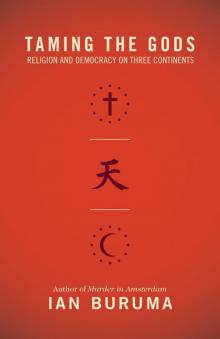 Taming the Gods
Taming the Gods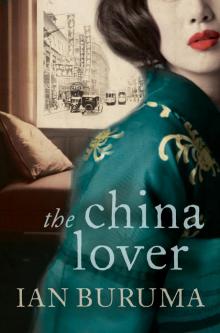 The China Lover
The China Lover A Tokyo Romance
A Tokyo Romance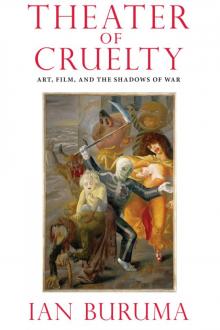 Theater of Cruelty
Theater of Cruelty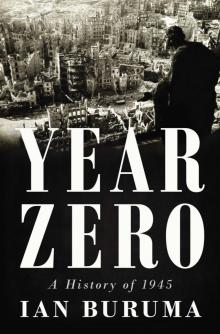 Year Zero
Year Zero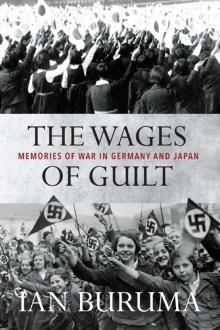 The Wages of Guilt
The Wages of Guilt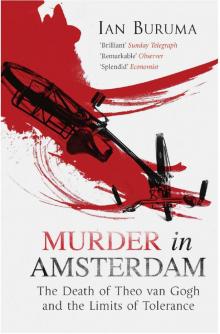 Murder in Amsterdam
Murder in Amsterdam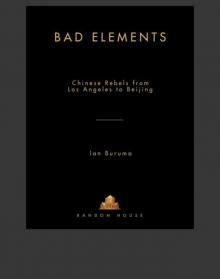 Bad Elements
Bad Elements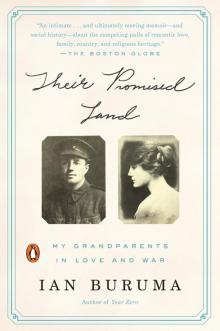 Their Promised Land
Their Promised Land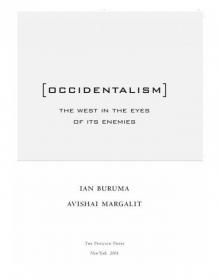 Occidentalism
Occidentalism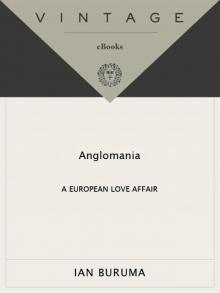 Anglomania
Anglomania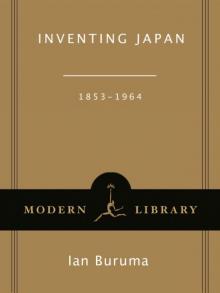 Inventing Japan: 1853-1964 (Modern Library Chronicles)
Inventing Japan: 1853-1964 (Modern Library Chronicles)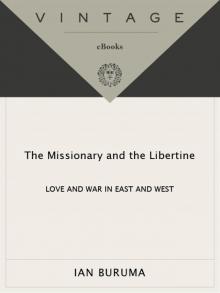 The Missionary and the Libertine
The Missionary and the Libertine